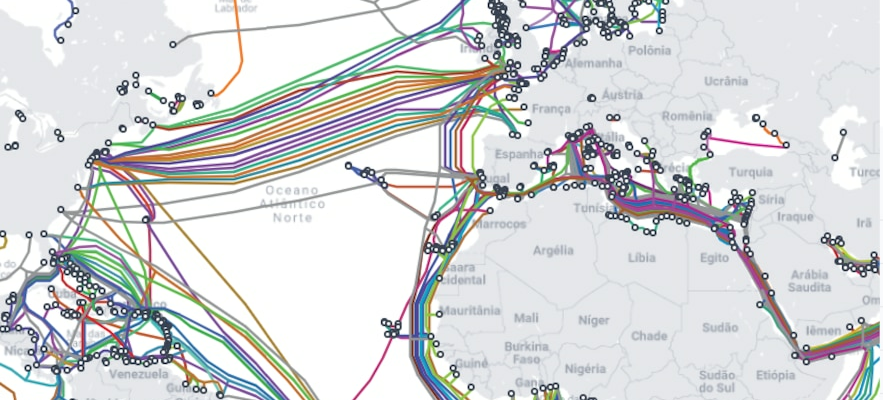The computer system of disrupted hospitals, messaging applications that stop receiving communications, internet companies and a country cut in the world, or almost. This is the catastrophic scenario, but not entirely unthinkable, feared by Portugal, faced with the increase in Russian ships in its waters, suspected of spying on underwater telecommunications cables.
In recent months, the Portuguese navy has repeatedly pointed out the growing number of boats not attached to NATO countries, off its coast. Since the war in Ukraine, it has thus operated 133 surveillance missions, including 73 in 2024, 46 in 2023 and 14 the previous year, the majority of them concerning Russian ships.
“Some carry goods, seeking to divert sanctions, but others are war machines,” said the Jornal de Notíciaswho mentions the spy ship Yantarwhich crossed the Portuguese maritime area in November, or the Russian frigate Admiral Gorchov“hypersonic missiles” platform “, reported three times in a year. At the beginning of 2025, the Portuguese air force also photographed the submarine Novorossiyskspecializing in scientific operations and collecting information.
Mire online telecommunications cables
The threat is taken seriously by NATO: during a recent visit to Lisbon, its secretary general Mark Rutte had indicated to the Portuguese Prime Minister, Luís Montenegro, that “long -range Russian ships and bombers threaten the Portuguese coast “. For Lieutenant-Colonel João Alvelos, member of the security observatory, organized crime and terrorism (Oscot), there is “no doubt” that these operations target maritime cables in Portuguese waters, by which transit 10 to 15 % of international communications.
In March 2023, the chief of staff of the navy himself, the vice-admiral Henrique Gouveia e Melo, had confirmed espionage cables by a Russian ship, off Porto Santo, in Madeira. The global Internet is, in fact, 97 % provided by an underwater network of hundreds of thousands of kilometers connecting the continents between them, of which around twenty of the most important cables go through Portugal.
In total, around twenty submarine cables pass through Portugal to America, Africa or the Middle East. Credits: Submarine Cable MAP.
© / Sublined cables from Portugal
In March 2024, the country notably connected the 2africa optical fiber cable (administered, among others, by Meta, Orange and China Mobile International), the most important in the world, at the Carcavelos station, near Lisbon. With a length of 45,000 kilometers, it allows communication between 33 countries in Europe, Africa, the Middle East and Asia. “It offers additional capacity to meet growing global demand for telecommunications: Internet services, videoconferences, multimedia and mobile applications advanced for digital video, high definition television, Cloud”, wrote at the time the Jornal de Negócios.
“Critical infrastructure”
But specialists are concerned about the consequences of an attack on these facilities, both in Portugal and abroad. All the more after the sabotage of several Baltic Sea cables at the end of 2024, involving Chinese and Russian ships. “The whole functioning of our communications and our digital economy is dependent on a critical physical infrastructure which can be damaged,” explains Sandra Fernandes, specialist in international relations at the University of Minho, with the Jornal de Notícias. Currently, billions of euros in transaction use these underwater paths every day: an interruption of these connections could thus generate serious economic disorders.
“Saborate a cable like these is to interrupt the exchange of information for six months, at best […] And I have doubts that there is a submarine that is able to repair them, “said Lieutenant-Colonel João Alvelos, member of the Oscot, to the same newspaper. For his part, the director of The cybersecurity of Agap2it, a Portuguese company operating in the information systems sector, is more prudent.
Damage to a cable does not automatically mean an internet disconnection, explains Marcelo Nascimento to the CNN Portugalsaying that there are security mechanisms that can be activated in this scenario: “There are other ways to obtain information, satellites are part of it. This works for mobile data, for example”.
Christian Bueger, maritime security expert, and author of a report of the European Commission published in 2022, alert for several years on this risk. “In countries like France and Portugal, security of underwater cables is an increasing issue for naval forces,” said the note. But a challenge remains: if there are several international agreements and conventions which can include the protection of submarine cables, “there is nevertheless a legal vacuum on its practice”.
